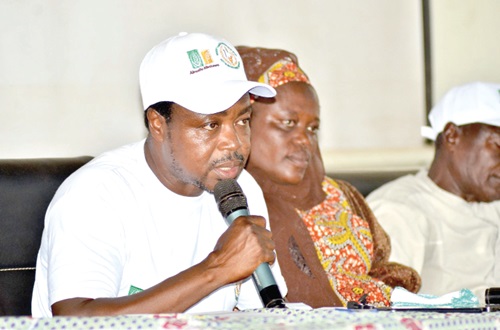
Dr Nyaaba underscores need to achieve food sufficiency
The Peasant Farmers Association of Ghana (PFAG) has reaffirmed its commitment to effectively collaborate with the government and other private sector actors towards achieving self-sufficiency in food production in Ghana.
Advertisement
A member of PFAG, Dr Charles Kwowe Nyaaba, said the association was working with key stakeholders towards achieving self-sufficiency in other agricultural commodities such as soya bean, rice and maize as it did for sorghum.
He said, “We cannot do that without commitment from our policymakers in ensuring comprehensive policies and initiatives that prioritise agricultural investment, modernisation of agriculture and the welfare of farmers”.
Inaugural ceremony
Dr Nyaaba, who is also the Chief Executive Officer (CEO) of Akuafo Nketewa Company Limited, the business wing of PFAG, was speaking at the inaugural Peasant Farmers Day celebration in Navrongo in the Kassena Nankana Municipality in the Upper East Region last Wednesday.
As part of the event, there was training for the farmers on the quality of agroecology products, as well as the Planting for Food and Jobs Programme (PFG 2.0). The well-attended ceremony was on the theme: “Deepening the role of smallholder farmers in promoting food and nutrition security amid climate change and global crises”.
He noted that PFAG, through Akuafo Nketewa Company Limited, committed in 2018 to ensure that Ghana became self-sufficient in most staple foods, using sorghum as a case study, saying “This was done by providing support in the area of quality seeds, fertiliser agronomic training and guaranteed market for sorghum”.
Rain-fed agriculture
Dr Nyaaba said one could not do meaningful farming currently by just relying on rainfall and that across the globe, irrigation was being prioritised as a key catalyst towards the growth of the agricultural sector.
 Participants
Participants
He, therefore, urged the government and political parties to re-invigorate interest in constructing the Pwalugu Multi-purpose dam project, re-engineering and desilting all silted dams, including those constructed under the one village, one dam policy.
Additionally, he proposed a novel initiative of one household, one borehole, especially in the five northern regions to motivate the youth to engage in dry-season vegetable farming to give true meaning to all-year-round farming.
The CEO alleged that there was corruption in the national awards for farmers as well as the provision of inputs to support farmers. He entreated farmers not to judge political parties' manifestos by how articulate and attractive the issues were but how committed they were to addressing issues confronting the agricultural sector devoid of politicisation.
Rice, maize glut
The National President, of PFAG, Wepia Awal A. Adugwala, said at the end of the last agricultural season, farmers were able to produce enough rice and maize but there was no market for them leading to post-harvest losses.
Despite the glut in maize, he questioned why the government, through the Biosafety Authority, granted permits to some individuals and organisations to import genetically modified maize and soya beans into the country.
While putting across PFAG’s opposition to this move, he indicated that there were scientists at the Council for Scientific and Industrial Research (CSIR) capable of using traditional breeding methods to improve upon seeds in the country.
Writer’s email; [email protected].



